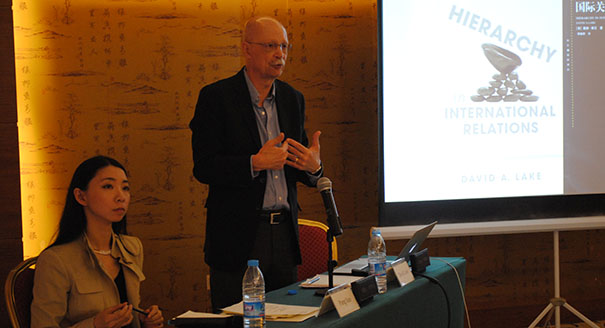Registration
You will receive an email confirming your registration.
China’s dramatic rise is reshaping the global order and prompting countries both large and small to reassess how they interact with one another. In his book Hierarchy in International Relations, David Lake describes how statecraft is informed not only by the capabilities of individual countries, but also by hierarchical relationships between great powers and their neighbors. Lake contends that the international system is built on voluntary agreements through which dominant countries offer public goods like security and governance in exchange for compliance with global norms.
Carnegie–Tsinghua’s Pang Xun hosted a discussion with David Lake about the future of the global order and what lessons can be drawn from U.S. leadership in security and economic affairs during the twentieth century. These insights shed light on how China’s emergence as a global power is shaping, and is shaped by, the existing international system.
Discussion Highlights
Realism and International Hierarchies: Panelists pointed out that the assumption that all countries must rely chiefly on themselves for security and prosperity does not account for the behavior of all states. They explained that more and less powerful countries form international hierarchies when such arrangements are mutually beneficial. These associations allow countries to coordinate policy and provide incentives for them to enhance mutual security, promote trade, and specialize in areas of economic comparative advantage.
Great Powers and Stability: Panelists asserted that the emergence of new great powers and the resulting shift to a bipolar or multipolar international system does not inherently imply that the world will become less predictable and stable. They suggested that stability becomes a concern when great powers form competing groups of strategic partners. This is especially true when such groups are economically exclusive, like the U.S.-Soviet relationship during the Cold War.
Legal and Relational Authority: Participants noted that many scholars of international relations focus on authority in terms of formal legal and institutional arrangements between states, including participation in multilateral organizations such as the UN or the WTO. They argued, however, that hierarchical interactions between countries involve bilateral negotiations and therefore have a significant relational component. They concluded that both types of engagement shape the international order.
The Cost-Effectiveness of Authority: Panelists explained that leading countries exercise power most efficiently by coordinating with other supportive states. They suggested that great powers enjoy more influence on other countries’ decisionmaking when they are able to demonstrate to these partners the benefits of cooperation. Contributing to global governance, strategic stability, and political order is a key way that top countries can persuade other states to follow their lead.
Sino-U.S. Relations and Regional Partnerships: As China rises, it naturally will seek to foster closer cooperative relationships with other countries, panelists asserted. Like China, the United States is also expected to build and enhance partnerships with other states, especially in Asia given the Obama administration’s pivot to the region. Participants emphasized the importance of conducting these diplomatic interactions with transparency and mutual respect to foster strategic trust and maintain stability.
Pang Xun
Pang Xun is a resident scholar and deputy director of the Carnegie–Tsinghua Center for Global Policy. Her recent research focuses on international development, emerging economies, and international governance.
David Lake
David Lake is a professor of political science at the University of California, San Diego. He is also the director of the Yankelovich Center, a university-affiliated public policy research institute.
